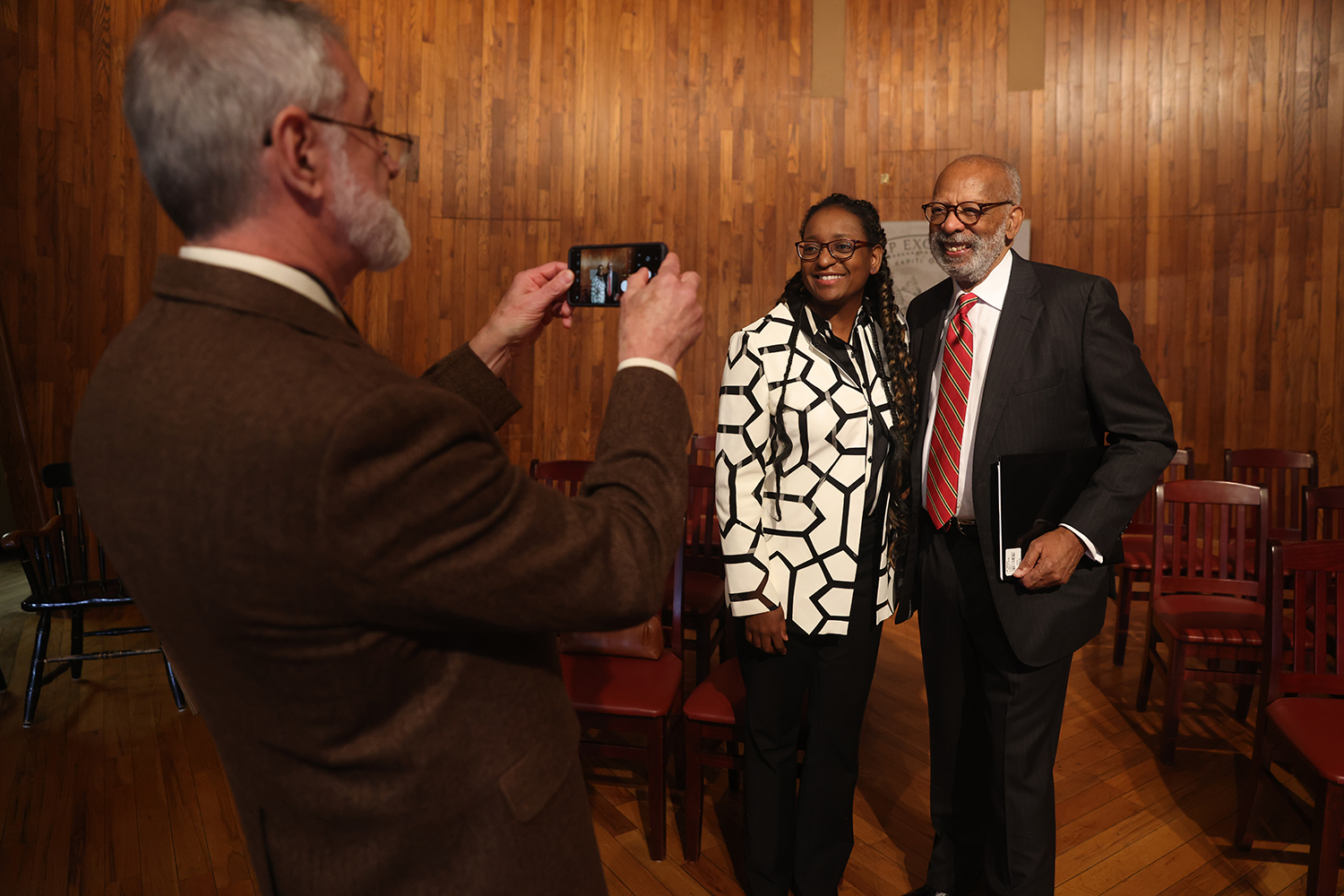Civil rights advocate
Civil rights advocate
receives Phillips Award
Jim Coleman ’66 addressed an Assembly Hall audience and visited with students.
Attorney and longtime Duke Law School professor James E. Coleman ’66; P’16 was honored this week with the 2024 John and Elizabeth Phillips Award, which recognizes an Exonian who has contributed significantly to the welfare of community, country or humanity. Sam Brown ’92, trustee and president of Exeter’s General Alumni Association, presented Coleman with the award in assembly Friday.
“As an attorney, law professor and advocate for civil and constitutional rights, you have dedicated your life’s work to pursuing justice and fair treatment for everyone under the law,” Brown said, reading from the award citation. “You have led nationally recognized efforts on behalf of death penalty reform and the wrongfully convicted and have mentored and inspired a new generation of lawyers with what one longtime friend calls your distinctive blend of ‘passion and principle.’”
In his acceptance remarks, Coleman said he was “humbled and grateful beyond adequate words” to be receiving the John and Elizabeth Phillips Award. He spoke of the award’s first recipient, Burke Marshall ’40, who served as assistant attorney general in charge of the Justice Department’s civil rights division during the administration of President John F. Kennedy. “For me to be associated with Burke Marshall through Exeter and this award has special meaning,” Coleman said.
A life-changing experience
Coleman spoke about growing up in Charlotte, North Carolina, where he lived in a three-room house with his parents and six younger siblings and attended racially segregated schools. “Our schools were intentionally denied the resources that white public schools received, and we often had to make do with their hand me down books and supplies,” he said. “But the black teachers at our inferior schools did not saddle us with the heavy burden of being told that the students were inferior.”
Instead, Coleman said, his teachers instilled him with the confidence that through hard work, he could achieve whatever he set out to do. In the spring of his 11th grade year, his guidance counselor, Marjorie Belton, connected him with a wealthy white friend of hers who wanted to pay for a student from his school to attend a five-week summer enrichment program at Exeter. Coleman had never heard of the Academy at the time.
“In June 1964, I packed my cheap metal footlocker that I purchased with money I earned as a caddy and boarded a Greyhound bus for an 830-mile trip north,” he recalled. “My grandmother gave me $20 and told me to come home if I didn’t like the place.”
In fact, he ended up not only staying for that summer but returning for a post-graduate year in 1965 after his graduation from high school in Charlotte. “That year … was the best and most important academic experience of my life,” Coleman said. He also joined the track team, learning to compete in the high jump from longtime Exeter track coach Ralph Lovshin. He would go on to be an All-Ivy high jumper at Harvard University.
Though there were relatively few Black students at Exeter at the time he attended, Coleman says he wasn’t made to feel like an outsider by his teachers or classmates. “That allowed me to do my best, unencumbered by the kind of self-doubts engendered by the ongoing public debates that take place today about whether students of color should be at places like Exeter,” Coleman said. “The only question is not why that they belong at places like Exeter, but what places like Exeter can do to ensure their success as students.”

Law as a public service
After graduating from Harvard and earning his law degree at Columbia Law School, Coleman practiced law for decades with firms in New York City and Washington, D.C. As a young lawyer, he took leaves of absences to serve in government roles, including chief counsel to the House Ethics Committee and deputy general counsel to the U.S. Department of Education.
At the prestigious D.C. law firm of Wilmer, Cutler & Pickering, where he became a partner in 1982, Coleman litigated a wide range of cases, including criminal, civil commercial, natural gas regulatory, employment discrimination and civil rights. Through the firm’s pro bono program, he became involved with death penalty cases, including the final post-conviction capital punishment appeal of serial killer Ted Bundy.
“Despite heavy criticism, you stood firm in your duty to protect the constitutional rights of your client and uphold the rule of law under intense media pressure,” Brown read from the award citation. “You went on to lead death penalty reform efforts for the American Bar Association and others.”
Now a member of the Duke University faculty for more than 25 years, Coleman is currently the John S. Bradway Professor of the Practice of Law. He also co-founded and directs the Wrongful Convictions Clinic at Duke Law School, which investigates plausible claims of innocence made by people incarcerated for felonies in North Carolina. Since 2011, Coleman and the students in the clinic have secured exonerations for 11 clients, many of whom served decades in prison for crimes they didn’t commit.
Connecting across the generations
In accepting the John and Elizabeth Phillips Award, Coleman credited his experience at Exeter with teaching him to be a stronger, more confident and engaged student, and showing him the possibility of opportunities he had never been able to imagine before he came to the Academy.
“My presence at Exeter changed both me and Exeter,” Coleman told the assembled students, faculty, staff and Trustees. “My life’s story became part of Exeter’s story and my subsequent accomplishments became part of Exeter’s legacy.”
After the award presentation in assembly, Coleman got the chance to connect with current Exonians by sitting in on an 11th grade English class and a class in Religion, Ethics and Philosophy. He also attended a lunch with students in the Elting Room.